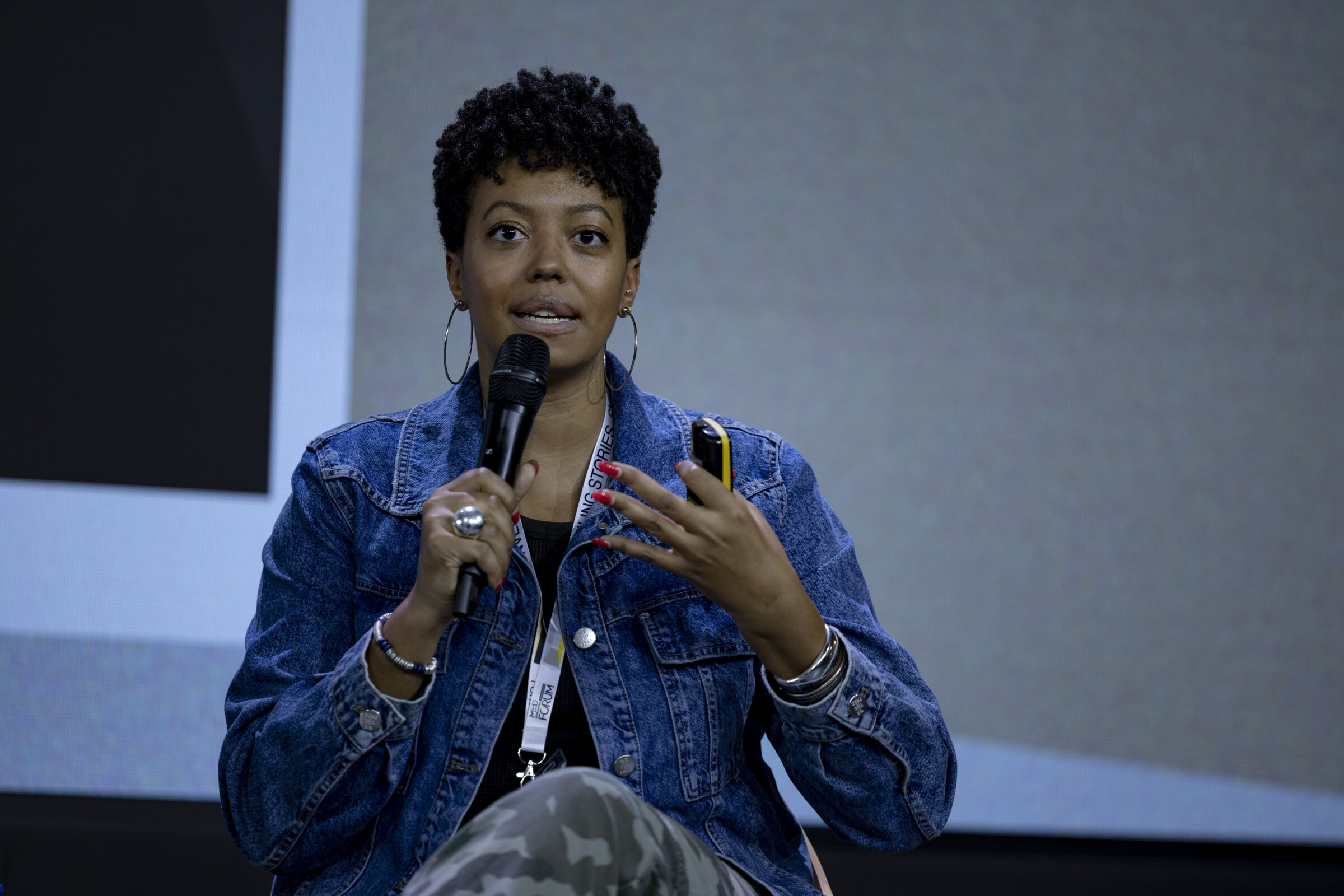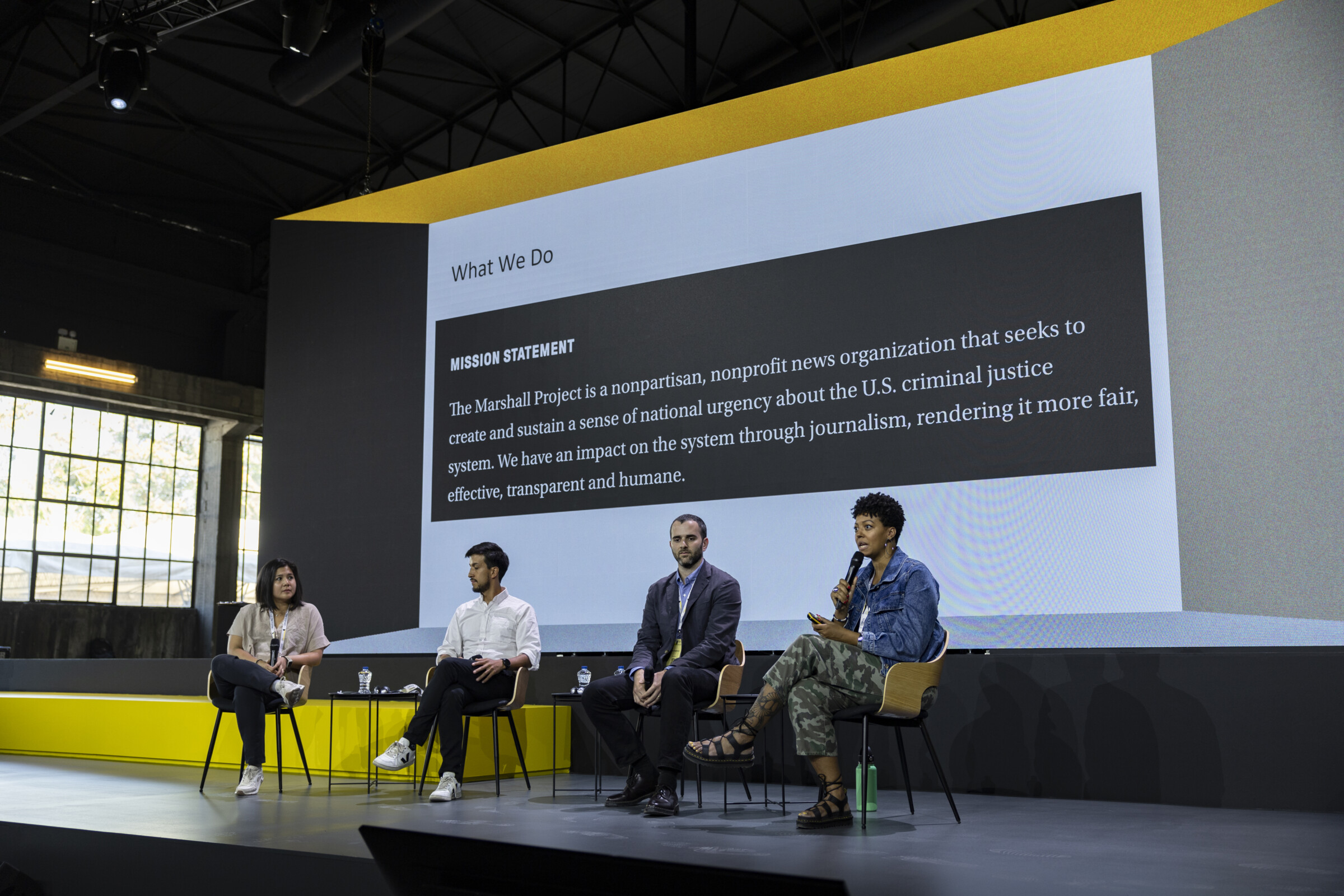In a time when democracy is threatened, people are losing trust in the media. How can journalists build communities in their investigations and why is it important? Nicole Lewis, Engagement Editor at The Marshall Project, spoke with Anna Hallgren, a journalist and graduate of the University of Göteborg, as part of the Pop-Up Newsroom at the iMEdD International Journalism Forum 2024, sharing her perspective on the issue.
Deepfakes and attention retention

What can we learn by focusing on how people react to manipulated or synthetic visual content? A multidisciplinary team of journalism professors attempted to challenge the 2024 iMEdD International Journalism Forum attendees’ misconceptions and cognitive biases by studying the effect deepfakes have on them at the Forum’s Media Village. Reported by University of Hong Kong journalism student Hiu Fung Alvin for the Forum’s Pop-Up Newsroom.
“When I’m trying to make change and make things better, I don’t see how you cannot do this work,” said Nicole Lewis.
She spoke on Friday, September 27, at the iMEdD International Journalism Forum 2024 on a panel about how to build communities. Alongside Jonathan Rodríguez, Outreach Program Manager at the Pulitzer Center, and Max Siegelbaum, Special Projects Editor and Co-Founder of Documented, Lewis shared her experiences in reaching underserved communities. The panel was moderated by Lam Thuy Vo, Associate Professor at the Craig Newmark Graduate School of Journalism at CUNY.
While Lewis talked about the justice system in the U.S. and how she reached people behind bars, Siegelbaum shared how he covers immigrant communities in New York City. Rodríguez talked about his outreach team – with a special focus on Latin America – and shared some of his experiences of working with communities that do not speak English in the U.S. and where misinformation is thriving.
“I am so inspired,” Lewis said when she got off stage to meet for our interview. “This work is difficult, and I think it’s really inspiring to see other journalists who have a shared approach.”
The Marshall Project, where Lewis is an Engagement Editor, is a nonpartisan, nonprofit news organization that seeks to create and sustain a sense of national urgency about the U.S. criminal justice system.

There are so many people who could be reading and consuming our work, who are just naturally aligned with our mission. And we weren’t really talking or thinking about, how do we serve them?
Nicole Lewis, Engagement Editor of The Marshall Project
Noticing a gap in the reporting
When Nicole Lewis started working as a reporter at the Marshall Project in 2018, she noticed that they were missing an opportunity. “I learned that our general audience tended to be white and better educated. They were often lawyers and policymakers. So, I was thinking, we’re really missing something. The people who consume us do not reflect at all the people who are in the system.”
According to a study, about half of Americans have a family member who’s been in prison.
“There are so many people who could be reading and consuming our work, who are just naturally aligned with our mission. And we weren’t really talking or thinking about, how do we serve them?”
Lewis shared her ideas with the organization and began experimenting with small projects. Today, as the Engagement Editor at The Marshall Project, she has successfully surveyed 50,000 incarcerated individuals.
“I do not want to be at risk of being shot and killed by the police”
In her work, she spends a lot of time figuring out how to listen to communities and how to tell stories that are going to resonate with the affected. Lewis said that this is important for multiple reasons. One of them is change.
“It is really thinking about how you can make change stick (…) For me, it is about giving the community tools to make decisions and to act.”
Growing up, Lewis learned how the systems in her country function. “It is kind of terrifying (…) I do not want to live in a country with a system like this. I do not want to be at risk of being shot and killed by the police.”
While The Marshall Project often sparks change, it is not an advocacy organization. When asked how she approaches journalism in a way that can drive change, Lewis said: “We try to make as thoughtful as possible editorial decisions in terms of design, how we present information so that things are balanced. We treat all the different sorts of candidates and stakeholders equally (…) we are really making every effort to hear from everyone on all sides of the issue. (…) we are not pointing them in one way or another.”
How to build communities as a journalist
- Listen
- Let the community define the problem and angle on your story
- Build relationships for the long haul
- Bring your work and findings back to the community and gather feedback and follow up
- Do these steps again and again and again

“It only takes one person to open the door”
In times of misinformation and people losing trust in media, Lewis explains that people are often skeptical when she reaches out to a community for the first time. “It is about staying in contact (…) and building relationships,” she added.
Building communities presents two main challenges. One is getting people to engage with the work in a sustained way in their busy lives. The second is how to measure change. “We have been thinking about change for a long time. So, it can be hard to define what the impact is,” Lewis said.
When I’m trying to make a change and make things better, I don’t see how you cannot do this work
Nicole Lewis, Engagement Editor of The Marshall Project
Who would US prisoners vote for in the upcoming election?
Lewis concluded the interview by saying that she is proud of her most recent project, a survey of 50,000 US prisoners regarding the upcoming US presidential election. Lewis and her team at the Marshall Project ask them what they think about the election, who they would vote for, and if they think America is ready for a female president, among others. This is an ongoing project to be published in October.
“The biggest takeaway that I can share (…) is that people are really grappling (…) because Donald Trump has been convicted and Kamala Harris has a record as a prosecutor (…) What does this mean for them and who is going to be more sympathetic and understanding to the needs of prison?”
Check out all Pop-Up Newsroom 2024 stories here
Watch the session on demand